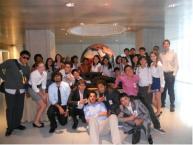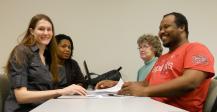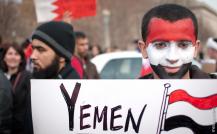|
|
You've Got to be Taught: Conflict Resolution Education in Washington D.C. SchoolsRodgers and Hammerstein wrote a heart-wrenching song for their musical South Pacific in 1949 with lyrics such as these: “You’ve got to be taught To hate and fear; Before you are six or seven or eight, To hate all the people your relatives hate”. What we really should be doing, of course, is to carefully teach children to love and care about others and to treat everyone with dignity and respect. Rodgers and Hammerstein were right on about the age framework. Early childhood – up to about age eight – is when we learn most of our patterns of behavior especially those behaviors that have to do with relationships, and, indeed, we learn most of those patterns from our relatives. Fortunately, learning occurs throughout the human lifespan and, no matter what we learned as children, we can all learn to treat others as we wish to be... |
 |
Fellows' Follow-on Activities: Benjamin Franklin Institute with AsiaOne of the inherent challenges to educational exchanges is ensuring that individual transformations during an intensive experience can be sustained and new learning integrated and used in the home context. To address this concern, the Benjamin Franklin Summer Institute with Asia has included a follow-on component to it’s U.S. based program. The Institute is hosted by ICAR and the Alliance for Conflict Transformation and sponsored by the Bureau of Educational and Cultural Affairs, U.S. Department of State. In the summer of 2010, the program brought together thirty six teenagers from Afghanistan, Pakistan, Tajikistan, Turkmenistan and the U.S. to help participants develop a deeper understanding of global issues, a sense of civic responsibility, and leadership skills that would allow them to become agents of positive action within their communities. |
 |
Conflict Resolution Education: Applied Theory and Practice in Washington D.C. SchoolsWhen the time came to explore our options at ICAR as Masters and Ph.D. students for a capstone project, we struggled like many, with deciding whether to write a thesis, to under take an internship, or to join an Applied Practice and Theory (APT) team. For us an internship was not quite an option as it would have gotten in the way of already over-committed schedules and we were looking for the opportunity to be more engaged with the practice aspect of conflict resolution. Additionally, some of us were interested specifically in the DC school system, or aspiring to teach, and this APT resonated with those interests. Our respective course work had also exposed us quite a bit to the international dimension of ICAR and we believed that focusing on issues at a domestic level was more suitable to our needs. |
 |
Civil Society and Peacebuilding: Book Launch with Thania PaffenholzOn March 11, 2011, ICAR hosted Dr. Thania Paffenholz to discuss her newest publication, “Civil Society and Peacebuilding: A Critical Assessment.” ICAR Professor Dennis Sandole gave an introduction, praising Paffenholz’s work in the Peacebuilding field in general, and especially focusing on the benefits, both for academics and practitioners, of these newest findings. After these words, Dr. Paffenholz began a presentation on Civil Society and Peacebuilding, the impetus for the book, the research approach, findings, and policy implications for the field. |
 |
Student Opinion – Demonstrations in the Middle East: Yemen’s Got TalentRecent youth revolutions have created an unprecedented phenomenon in the Arab world. Who would have thought that throngs of young, irate Arabs would discover a powerful mechanism that rattles the toughest leaders? For the first time in our history, we are witnessing Arab dictators’ humbleness. While the case of Libya is an exception, almost all Arab rulers are pledging an array of concessions and reforms. Will that work for all countries, or will the wave of discontent continue to flush out stubborn leaders? One would assume that if peoples’ needs are met, then it is in their interest to shift positions and accept the reforms. However, the streets of countries like Yemen are still boiling and the revolutionaries are continuing their momentum. Layered onto the chaos are a number of political actors who have become skilled dancers,... |
 |
Greg Stanton, Research Professor in Genocide StudiesGreg Stanton’s life has been devoted to understanding and preventing genocide and other mass atrocities. He has alternated the settings for his work between academia, the State Department, and non-governmental organizations. His work has led the way to important advances in the field of international criminal law, and has helped develop the emerging norm of the responsibility to protect. |
 |
Nicole Grim, Conflict Analysis and Resolution UndergraduateNicole Grim came to Mason in the Fall of 2009, she began her year as a Government and International Politics major. Nicole took her first government class in the spring, and the next semester decided to follow the Global Affairs track instead. While sitting in her International Relations class, Nicole realized that what had really drawn me to global studies wasn’t just the politics- it was the problems. After considering Conflict Analysis and Resolution (CAR) as a minor, Nicole took her first CAR class and fell in love with the program. Now that she has changed to a double major, in global affairs and conflict analysis and resolution and anticipates graduating in May, 2013. |



